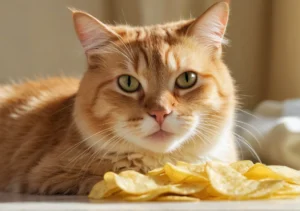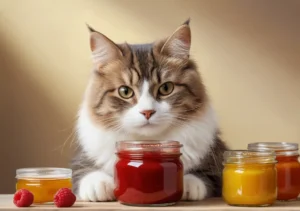Cats are known for their picky eating habits, but have you ever wondered why they can’t have citrus fruits? The answer lies in their unique digestive system and sensitivity to certain compounds found in these fruits.
The Dangers of Citrus for Cats
Cats and citrus fruits don’t mix well, and for good reason. Citrus fruits contain compounds that can be harmful to our feline friends. Even though cats are obligate carnivores and don’t typically go for fruits in the wild, they may be attracted to the smell or taste of citrus. However, ingestion of citrus fruits can lead to digestive upset in cats, causing symptoms like vomiting, diarrhea, and stomach pain.
But the dangers of citrus for cats go beyond just digestive issues. Citrus fruits also contain essential oils that are toxic to cats. These oils are found in the peel, leaves, and seeds of citrus fruits, and can be harmful if ingested or even if a cat comes into contact with them. Citrus essential oils can cause skin irritation, respiratory issues, and even liver damage in cats. So it’s best to keep all forms of citrus away from your feline friends to keep them safe and healthy.
Citrus Essential Oils and Cats
While citrus fruits themselves are harmful to cats, citrus essential oils are even more dangerous. These concentrated oils are commonly used in aromatherapy, cleaning products, and even personal care items. However, citrus essential oils can be extremely toxic to cats, even if they don’t directly ingest them. The oils can be absorbed through a cat’s skin or respiratory system, leading to a range of serious health issues.
The high concentration of compounds in citrus essential oils can overwhelm a cat’s sensitive system , leading to symptoms like drooling, vomiting, tremors, and even difficulty breathing. It’s crucial to keep all citrus essential oils out of reach of your cat to prevent any accidental exposure. If you suspect that your cat has come into contact with citrus essential oils, contact your veterinarian immediately for guidance on how to proceed.
Remember, a little precaution goes a long way when it comes to keeping our furry friends safe and healthy. And when it comes to citrus and cats, it’s better to be safe than sorry.
Symptoms of Citrus Toxicity in Cats
If your furry feline friend happens to get their paws on some citrus fruits, it’s crucial to be on the lookout for any signs of citrus toxicity. Cats lack a specific enzyme needed to properly metabolize citrus fruits, leading to potential health issues. Keep an eye out for symptoms such as vomiting, diarrhea, lethargy, and even sensitivity to light. If you notice any of these signs, it’s time to whisk your whiskered companion off to the vet pronto.
Alternatives to Citrus for Cats
When it comes to treating your cat to some tasty treats, it’s wise to steer clear of citrus fruits. Luckily, there are plenty of safe and cat-friendly alternatives that your feline friend will love just as much. Opt for some cooked chicken, steamed carrots, or even a small amount of pumpkin puree. These alternatives are not only safe for your kitty but also provide a delicious and nutritious snack. Remember, it’s always better to be safe than sorry when it comes to your cat’s health.
Safe Alternatives to Citrus Fruits for Cats:
- Cooked Chicken
- Steamed Carrots
- Pumpkin Puree
Keep your cat happy and healthy by sticking to safe snack options like these. Your purring pal will thank you for it!
Cats’ Unique Sense of Smell and Taste
Cats have a unique sense of smell and taste that differ from humans. Their olfactory receptors are extremely sensitive, making strong scents overwhelming for them. Citrus fruits contain essential oils that are pungent to cats’ delicate noses, causing them to steer clear of anything citrusy. Moreover, cats have taste buds that are less receptive to sweet and sour flavors, which are predominant in citrus fruits. This combination of heightened smell and taste makes citrus fruits unappealing to our feline friends.
Fun Fact: Cats and Sour Flavors
Did you know that cats have a genetic predisposition to avoid sour flavors like citrus fruits? This aversion can be traced back to their evolution as obligate carnivores. In the wild, cats primarily eat meat, which is savory and lacks sour notes. Sourness in food often indicates spoilage or the presence of toxins, which could be harmful to cats. Therefore, their natural instinct is to avoid sour tastes like those found in citrus fruits. So next time you reach for a lemon, don’t be surprised if your cat gives it a wide berth!
Additional Unique Insight: Cats’ aversion to citrus goes beyond just the taste and smell. Citrus fruits also contain compounds like limonene and linalool, which are toxic to cats. These substances can cause skin irritations, digestive issues, and even liver damage if ingested in large quantities. Therefore, it’s best to keep citrus fruits away from your feline companions to ensure their health and safety.
Interesting Trivia: Historical Perspectives on Cats and Citrus
Did you know that ancient Egyptians believed that cats were sacred animals who protected their homes from evil spirits? These feline friends were highly revered in Egyptian society, often depicted in art and even mummified alongside their owners.
When it comes to cats and citrus, historical beliefs also play a role. Ancient cultures viewed citrus fruits such as oranges and lemons as symbols of purity and fertility. However, they also believed that these fruits could be harmful to cats, leading to the common notion that cats should avoid citrus altogether.
This ancient wisdom has been passed down through the ages, and while modern science may not fully support these beliefs, many cat owners still err on the side of caution when it comes to feeding their feline companions citrus fruits.
Cat-Safe Citrus-Free Recipes for Treats
If you want to spoil your furry friend with homemade treats but want to steer clear of citrus ingredients, fear not! There are plenty of cat-safe recipes you can try that will keep your pet happy and healthy.
- Tuna Catnip Treats: Mix canned tuna with a sprinkle of catnip and bake for a crunchy treat that your cat will love.
- Chicken and Oat Biscuits: Combine cooked chicken with oats and a bit of water, then bake until crispy for a tasty snack.
- Salmon Purr-fait: Layer canned salmon with plain yogurt for a protein-packed treat that’s easy to make.
These homemade recipes are not only delicious but also free from any citrus ingredients that could potentially harm your cat. Treat your furry friend to some wholesome goodies that will have them purring with delight!
Alex, a passionate animal lover, has experience in training and understanding animal behavior. As a proud pet parent to two dogs and three cats, he founded AnimalReport.net to share insights from animal experts and expand his knowledge of the animal kingdom.




